
- •It's time to talk
- •12 Unit two
- •It's time to talk
- •Information
- •Vocabulary
- •It's time to talk
- •26 Unit six
- •Is there a carpark? Are There mm
- •28 Unit seven
- •It's time to talk
- •1 Remember
- •It's my kind of town
- •Vocabulary
- •It's time to talk
- •48 Unit fourteen
- •5 Sans nrOnTlBks artSfN zonder GfffWzcw
- •Vocabulary
- •Information at Arriving without luggage
- •Vocabulary
- •60 Unit seventeen
- •Ivd. DArtU/
- •Vocabulary
- •It's time to talk
- •Isabelle Segura is a pa in Neuilly, just outside Paris. She talks about her working week.
- •IvcTion pro
- •It's time to talk
- •Vocabulary
- •78 Unit twenty-three
- •It's time to talk
- •Vocabulary
- •It's time to talk
- •Vocabulary
- •It's time to talk
- •Vocabulary
- •7 Changing workspace
- •It's time to talk
- •7 Changing workspace
- •Its time to talk
- •It's time to talk
- •It's time to talk
- •Its time to talk
- •Verbs not usually in the continuous form
- •Irregular verbs
- •7 Changing workspace
- •8 The a team
- •Interviewer:
- •Interviewer:
- •Interviewer:
- •It's almost the weekend
- •7 Changing workspace
- •8 The a team
- •12 Do you salsa? I've got news for you lg 2d 3c 4h 5b 6f 7a Be
- •138 Answer key
- •Visited
- •140 Answer key
- •It's lime to talk
- •Inviting
- •142 Answer key
Information
Practise making two phone calls with your partner. Use the plan to help you make your calls. Student A should look at page 104. and Student B at page 106.
When you talk on the phone in English:
Speak your name slowly and clearly My nai
Say clearly Ihe reason lor your call I'm calling to
End positively: Thanks.
14 Unit two
On the agenda Speaking
Weekends
Social phrases
A! Ihe office
Your free!
When does
your weekend begin? When does il
finish?
Vocabulary

Arriving
at
Ihe office on Friday
A Hi. John.
B: Morning. How are you?
A:(1) ?
B Not bad A bit tired
A: (2) It's
almosl the
weekend.
A: Do you have any plans lor the
weekend?
B:
I'm going to visit my brother.
A:
(5) ?
Shall we eat out b
Yes, good idea c
Nevermind d
You too
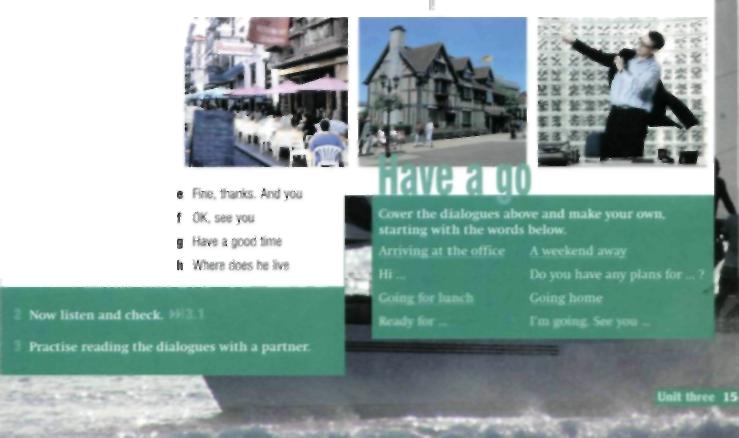 It's
al
It's
al
Complete the dialogues with phmst's (;i in below.
A weekend away
Going for lunch
A; Ready for some lunch?
B:(3)
A: Where do you want to eat? B:(4) ?
A: Yes. it's Friday. The new Italian B: In Stratford-upon-Avon place9 A; Stratford? It's a lovely place.
B: Great Let's go. (6) !
WED TWMf m\ MI |
|
|||
1 |
a |
V3 |
) ' |
|
~~ff |
9 |
10 |
11 |
|
15 |
16 |
17 |
It |
|
22 |
23 |
24 |
25 |
|
B: Thanks. I wil
A: I'm going. See you next week.
B: (7)
A: Have a good weekend. B: Thanks. (8} Bye.
Listen to this
Enjoying
your weekend
Meet
Sally, Hinawi, Martina and
Jochen. Find
out how they enjoy their weekends.
Sally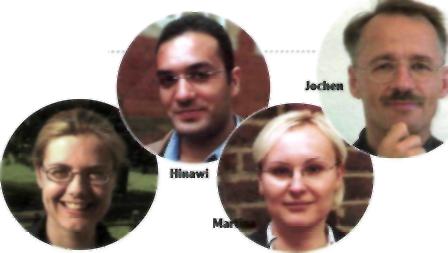
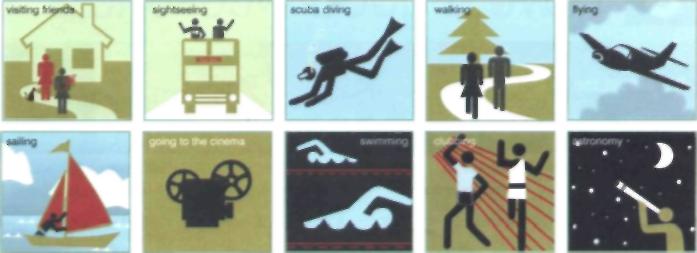
\\ h.it do vou think?
Listen again and decide which person has the most interesting weekend. Why? ►►IS.2
The words you need ... to talk about your free time
1 Look at the different activities in the box. Write them in the gaps.
Sports
Card and board games
Reading
Music - listening
Music - playing
Culture
Couch potato
Food
Socialising
Housework
football, swimming,.., skimq
chess, poker,
novels, poetry.
jazz, pop,
the piano, the saxophone
opera, theatre.
playing computer games, watching videos,
Chinese, Italian
inviting friends to dinner, going to restaurants, cleaning, hoovering,
Can you add one or two activities to each category?
Ask your partner to tell you one activity he/she loves and one activity he/she hates.
'Y^J |
fm draughts /) surfing the net |
|
a French |
r~ d* |
&\ ballet |
BtCO--\c |
\y ironing |
|
non-fiction |
A couch potato aid i no |
|
|
classical music |
|
the guitar |
|
going on holiday with friends |
16 Unit three
2 Look al these adjectives and match the opposites.
easy |
horrible |
expensive |
terrible |
dangerous |
safe |
interesting |
cheap |
fast |
unhealthy |
relaxing |
slow |
nice |
bad |
healthy |
boring |
fantastic |
stress fill |
good |
^*- difficult |
3 Now use the adjectives to make sentences about weekend activities.
Example:
Walking is very healthy.
Smoking is very unhealthy.
Test
vourpariiu'i
above. Your partner must say the opposite.

Interview three partners about two of their favourite free-time activities and complett
they do these activities and why thev like them. Use the questions and answers below to help you.
What
When
Why
Person A
Person B
Person C
Questions
What do you like doing in your free time?
Do you like ...?
What are you interested in ... ?
When do you ... ?
Why?
Answers
I love ... © I hate ... ©
I really like... I don't like...
I'm interested in ... I'm not very interested in
At the weekend. / On Mondays.
Because...
Remember to use -inQ lor things you love doing and hate doing:
• I lOVe Vie
• Mike/enioybeijifl with my lamily - I hate tunning
And
• I go swimming at Hie weekend.
![]()
Unit three 17
Meet
Anneli and Chiara. Anneli
works for Telia Mobile
in Sweden. Chiara works for Air Liquide in Italy
Mprth and sc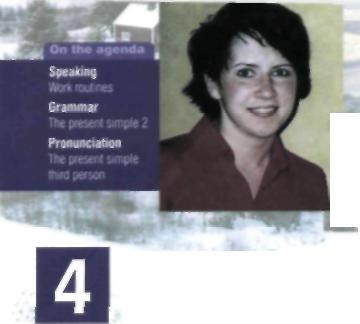



Listen to this
A working day In the north ... and in the south of Europe
We interviewed Anneli and Chiara about their working days. Look al the information about them. Then listen to them speaking and change any details which are not correct. ►N4.1
listen again. Are these sentences true or false?
Anneli brings food to work for lunch. T F
Anneli's work is sometimes stressful. T F
Chiara prefers working in the morning. T F
Chiara sometimes works at the weekend. T F
Warm
Are you a morning person? Of ate you an afternoon person?
Anneli |
Chiara |
• starts work at 8 |
• starts work at 9 |
• has lunch at 1 |
• has lunch al 12.30 |
• usually finishes work at 6 |
• has dinner at 8.30 |
What do vou think?
Which European working day do you prefer - the northern or the southern?
Anneli says: "Work can be very stressful sometimes.' What is stressful in your job?

2 Anneli
says: I usually
eat
at eleven tor one hour' Put these time adverbs in the correct
position below.
1 Complete the questions and answers below.
Question Positive Negajivg
When(1) She sometimes She (2)
she work? works on Saturday, like to work at
the weekend.
sometimes usually often rarely

Yes, she (3)
No, she doesn't.
1
no) very often
No, she isn't.
Look at the verb to be
Is she trom Milan? Yes, she (4)
Talking about everyday routines We can use the present simple with time adverbs (always, sometimes, etc.) and time expressions {every year, twice a week, etc.) to talk about things we do every day at work or at home.
always normally 100%
3 Chiara says she has lunch around one o'clock every day: Complete the time expressions below.
I have lunch in the canteen once or twice week.
I check my emails morning.
I travel to Brussels three a month.
18 Unit four
Grammar reference pages 111-113
Do it yourself

I
Stopping tress
I start normally v/ork at 7.30.
She travel on business once a year.
How often does she calls you?
Does you often speak English at work?
2 Complete the text below with the words in the box.
times
usually
never always every
Javier's life is (1) very busy. He is president
of his own company, Tecna, which makes equipment for farms. He doesn't begin too early because he
works late (2) evening. He (3)
finishes at 9 o'clock but sometimes latei. Javier goes
to Cuba three (4) a year to visit important
customers. He also travels to Australia, China,
Mexico and the USA, maybe 15 weeks (5)
year. So how does he stop stress? He walks to work most days and walks home for lunch. And he (6)
wor<s at the weekend. This is for spending
time with his family on the beach!
3 Complete these questions about Javier.
When / start work? When does he start work ?
What time / do finish?
How often / go to Cuba?
Where/goat lunchtime?
What / do at the weekend?
Test
vour partner
4 Match the questions (1-5) and answers (a-e).
Do you ever walk to work?
When do you normally start work?
How often do you go out for lunch?
When do you normally finish work?
What do you usually do in the evening1?
Now ask your partner the same questions.
a Not a lot. Sometimes I just listen to music.
b Before 8.30.
c No. I don't. I always drive.
d It depends but I'm normally at the office until 7.
e Never. I always have a sandwich at my desk.
Unit four 19
V*
"•"^
t/>
The present simple third person
Listen to the three ways in which we pronounce the third person -s in the present simple. Then say them aloud to your partner. >H 4.2
Tvoel Type 2 Type 3
M
gets
watches
Now listen to these verbs. Number them as type 1,2 or 3. »\ 4.3
leaves seHs organises listens
writes works meets manages
relaxes buys visits does
Now practise by saying all the words aloud.
It's time to talk
The Stress Check
In Britain, businesses lose €2.4 billion per year when people stay away from work because of stress. Do you have a lot of stress? Ask and answer the questions below with a partner.
Per day, how often do you: |
Always |
Often |
sometimes |
Pat |
New |
take re;. |
|
4 |
|
|
1 |
|
|
|
|
|
5 |
^ 1 you plan* |
5 |
|
|
|
|
^fl |
|
|
B |
4 |
|
•an four cups ofco! |
|
|
3 |
■ |
|
ies of physical ext- |
|
|
3 |
|
1 |
|
5 |
4 |
|
2 |
1 |
^^^^ |
1 |
|
|
|
5 |
».. |
|
|
|
|
1 |
^H |
|
4 |
|
2 |
1 |
P TOTAL |
|
|
|
|
|
f j^_ Add the numbers. TOTAL |
|
|
|
|
|
20 Unit (our
What is a good way to control stress?
Remember
When asking about routines, you can ask questions beginning:
• How often do you ... ?
• Do you usually .. 9 And you can answer with:
• I always/ollen/someiimes/never .
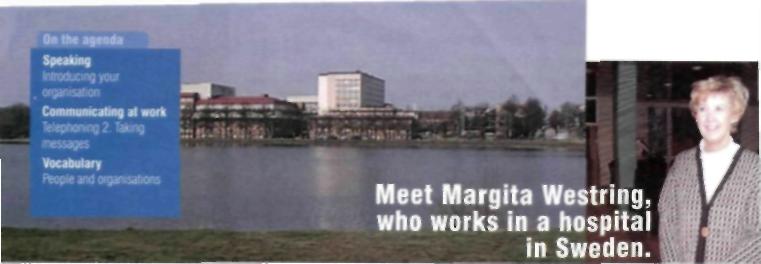

Health
care-public
or
private?
Wqrrn
up
1 flo
you think abouli lyourcoi
rw
happy.' rjaiiiyanflserv
■
Read on
Working at Vaxjo Hospital
1 Wc interviewed Margita
W'estring about her job. Match the headings with her answers.
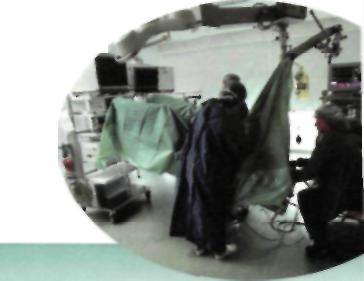
K^&very modern hospital. WeRy it's a 'county' hospital, so it's for the whole area not just the city. We have about 2.100 employees. Most of them are nurses - there are 900 nurses and about 200 doctors and then other employees too. We also use outside consultants. I think that at the moment we have around 350 hospital beds.
T
 he
customer comes first
he
customer comes firstwhy i like the job
objective in the Ttal is to focus on our customer, the patient. It's very important to talk to patients a lot so they understand what a doctor is doing. We also always make sure patients don't stay in hospital too long. We think people prefer to be out of hospital quickly and at home.
r
Bl/i Sweden, people pay 250 Swedish krona for every visit to a doctor. This is the standard cost for a national health service visit. Of course, you can go to our competitor, a private medical centre, but you pay 500 to 1,000 Swedish krona. It's a lot of money but some people are happy to pay.
flwjasahuman resources ^^ffer. I like working in the public sector because I want to look after people and not only think about profit and I like the idea that everyone has the right to health care. So I plan to stay at Vaxjo Hospital. I always want to work in the public sector and never go into the private sector.
Unit five 21
 2
Read ihe text again and answer these questions.
2
Read ihe text again and answer these questions.
How many people work at Vaxjo Hospital?
What is the most important objective for employees in Vaxjo Hospital?
How much does a national health service visit usually cost?
Why does Margita want to work in a public sector hospital?
wh.ii do you ihinls'
Margita says: 'I always want to work in the public sector and not go into the private sector.' Do you think it is better to work in the public or private sector?
The words you need ... to talk about people and organisations
1 Choose the correct words in these sentences about a clothing company in Paris.
We have over 3.000 employers / employees.
Our main competitor / competi I ive is AMCAP of the USA.
Most of our customs / customers are in the Paris area.
JCG is a very important supply / supplier for us. We buy textiles from them.
We sometimes use marketing consultants / consults to give us ideas.
Now make sentences about your organisation using the words you have chosen.
2 Complete the following sentences with the correct preposition from the box.
1 work a human resources officer. 1 work with people a lot.
1 am a customer service manager. It's my job to look our customers.
1 am the chief buyer. I look new and cheaper suppliers all the time.
1 am a personnel manager. I talk employees about personal development
I am a public relations officer. I look the newspapers every day.
1 am PA to the boss. I deal everything!
Now use some of the verbs and prepositions to make sentences about your job.
It's time to talk
i Prepare a short introduction to your organisation. Use the words in this unit and in Unit 2 to help you.
 External
External
Internal
Suppliers
Employees
Customers
Moss
Competitors
2 Now give a short talk to the other students in the class.
22 Unit five
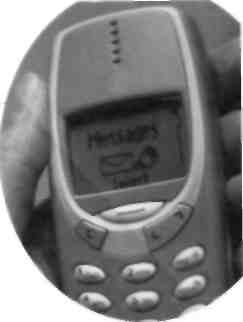 Communicating
at work
Communicating
at work
Telephoning 2: Taking messages
Could you spell that, please?
Work in pairs. Student A should look at page 104 and Student B at page 106.
Look at these questions:
Did you say b'0' p"?
Could you repeal that?
Ask your partner for his/her address and write it down. Use the questions to help you.
Could I have your number? ►►! 5.1
Listen to the way we say these phone numbers: 678586 784367 488598 598889 584989
Repeat the numbers to your partner.
Say your office, mobile and home numbers to your partner.
Could you spell that?
We usually say numbers individually. People in the UK say'oh'. People in Ihe USA say 'zero'. 00 44 = (he international code 01904 = ihe area/city code
Can I take a message?
1 Choose four of these sentences (a-h| to complete the phone conversation below.
a I'm afraid he's not in the office today.
b Could you ask him to call me back?
c He's not at his desk at the moment.
d Could you spell that, please?
A: Hello.
A; I'm afraid he's in a meeting. (1)
A: 01 course. (3)
A: Did you say f 7
A: OK, so that's F-i-a-l-a.
A: 787545.
A: Double 7 - 545. OK, Mr Fiala, (4)
e Can 1 take a message?
f Could I have your name and number?
g I'll make sure he gets the message.
h I'll call back later.
B: Could I speak to Mr Garcia?
B:{2)
B: Yes, my name's Fiala. Thai's F-i-a-l-a.
B: Yes, T. Fiala.
B: Yes. That's right. And my number is 7877545.
B: No. 7877545.
B: Thank you Goodbye.
Listen and chectc ►►! 5.2
Practise reading the conversation with a partner.
Practise taking messages. Student A should look at page 104. and Student B at page 107.
When lakino. messages on Ihe phone, remember to.
Ask lor spelling: Could you spell that?
Check spelling: Did you say
Repeal information you hear So that's
Unit five 23
Read what people alien say abc
Do yci :e?
living near my lamily, close to good shops -1 love shopping.
Asking lor help
Asking ahout Ihe puce
Asking aboul payment

 A:
Hello. 0) ? B:(3) please?
A:
Hello. 0) ? B:(3) please?
B: No. il's OK thanks. (2) A: Yes. ol course. The changing
A: OK Just ask me if you need some rooms are |usl there. help. B; Thank you.
A (A tewmmules later) So, how's that?
B: I'm nol sure. (4) Have
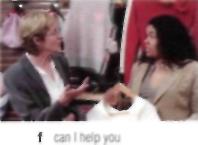
a how much is this
you gol it in a larger size? A. No. I'm sorry, we haven't. I B: Oh. I see. I think (5)
! Now listen and check.
I Practise reading the dialogues with a partner.
B. Excuse me. (6) please? A: That's €47, please.
A: It's €47.
B OK. I'll (7)
A: Fine. You can pay over there.
B: Thank you. (8) ?
A: Yes. of course. (9)
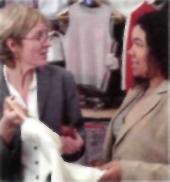
please. B:OK. A: Here's your card and
(10) Thank you
B Thank you. Goodbye.
Have a ao
Cover Ihe dialogues above and make your own. starting With the words below.
looking around Asking about the price
Hello...
Asking
for help Could
1 try
Asking about payment
That's...
j

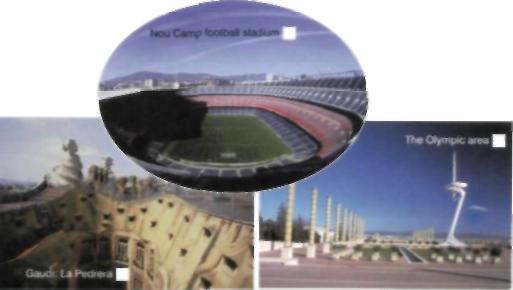
Listen to this
A shoppers' paradise
This is Montse Benet.
She lives in Barcelona
and works in a
primary school.
Listen to Montse talking ahout Barcelona and her love of shopping. Tick (•) Ihe pictures she talks about. ►►■■ 6.2Listen again. Are these sentences true or false? ►►! 6.2
Montse lives outside the centre of Barcelona.
Montse lives 20 minutes' walk from the Gothic quarter.
Prices are very high in the Modernist quarter.
4 Montse's favourite shopping area is the Passeig de Gracia. T
What do you think?
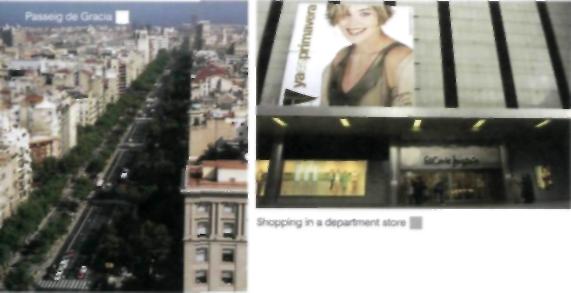
Would you like to live in Barcelona? Which things would you like to see and do?
The words you need ... to talk about where you live
Iff * t i * * ltllllffllltllt*ttllltltfft**■*•****•• »*■ »* * •« • ••• ••••tlltlttlltlfl
1 Choose the correct preposition in these sentences.
I live in j on the city centre. 5 Sitges is at / on the coast.
I live at / in quite a small street. 6 Sitges is about 40 kilometres for I from Barcelona.
I live near I by the main shopping centre. 7 Sitges is a small town not far of j from Barcelona.
I live on / outside Barcelona. 8 Barcelona is in I at the north-east of Spain.
Now listen and check. ►►! 6.3
Describe where you live with some similar sentences.
2 Montse and Saiiidiilhd iUC talking about what to see around
Barcelona. Complete the conversation witli the verbs in the box. takes catch go get walk
There is more than one possible answer for some of the gaps.
samantha: So. let's plan the weekend. Can we go somewhere?
montse Yes. what about Sitges? It's a really nice place. samantha: How far is it from Barcelona?
montse Not for. By bus. it (1 > about 40 minutes. Or perhaps we could (2) by train.
samantha: I'd like to go by bus. Where do we (3) it? •'
montse The bus station is quite close - it will only take us about five minute* to <4) there.
samantha: Good? And I've got a friend whn Hvps in Vilannv.i Is it far from Sirges?
montse No. it's quite close. We can probably (5) there by bus. It's a lovely place.
Now listen and check ►►! 6.4
